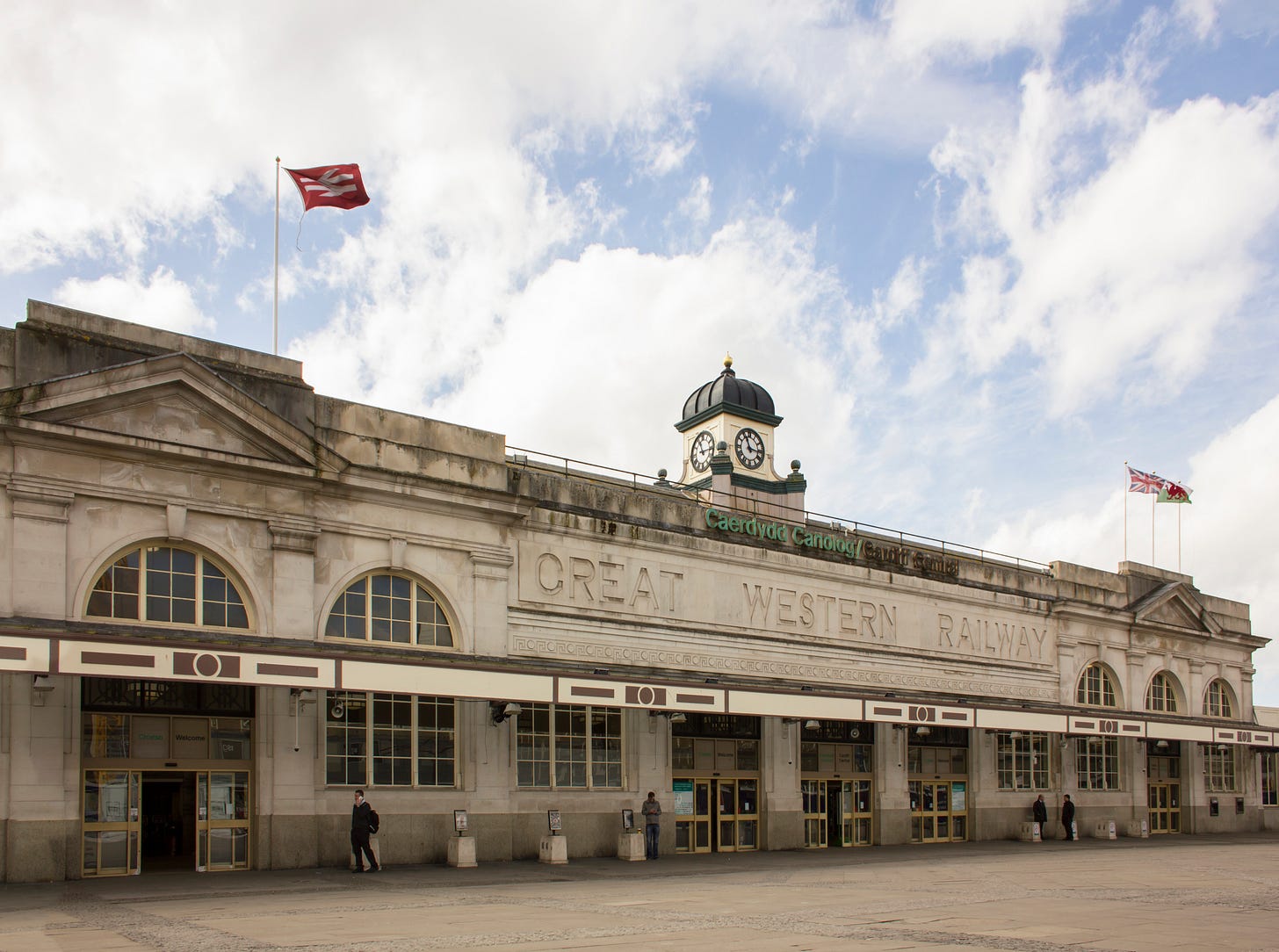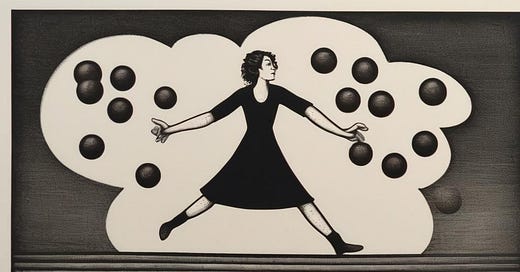This Writer’s Journey is telling the story of how - a long time ago now - I came by my first writing commissions.
Thank you to everyone who has subscribed. Your support means a lot. Special thanks to those people who have chosen to be paid subscribers.
If you’re enjoying my story, you might like to show your appreciation with a tip.
Until the new year I will be donating all tips to Crisis - a UK charity for homeless people.
********
Previously on THIS WRITER’S JOURNEY: I’ve completely stopped writing and have been auditioning for acting jobs. So far, I’ve been rejected by them all. I’ve now been invited to audition for a Theatre in Education company in Wales. I really want this job.
********
It’s a Tuesday morning, early in December 1978. I have a window seat on the London to Swansea Intercity 125.
My mind moves to the rhythm of the rails. There will be other jobs. There will be other jobs.
I’m trying to distract myself by remembering the Introduction to Philosophy module I took in my first term at university. If I am to avoid disappointment, I should channel Seneca and his Stoic pals. I must keep my expectations low. I must live in the moment. I must remain detached.
There will be other jobs.
The train drops me at Cardiff and speeds on its way to Swansea. I stand alone outside the station.
Seneca is no help. I want this job. I want it a lot.

I go off to find a bus.
Mid Glamorgan Theatre in Education (TIE) Project has two jobs on offer. They are seeing people all week. Today is Tuesday. They are auditioning six of us.
The day is run by a panel of three people, all around my age. Two men and a woman: Tim (gangly, round-shouldered, talkative); Robin (thicker-set, thoughtful, brooding eyes); and Annie (small, enthusiastic, thin as a stick). They smile a lot.
The morning is filled with improvisations and group discussions. We all get along famously, and we auditionees almost forget we’re in competition with each other. Almost.
At lunchtime, the three members of the panel huddle in a corner and whisper.
When they re-join us, Annie, Robin and Tim tell us we’re all brilliant, and they wish they could employ all of us. But, sadly, they can only invite three people to stay on for the interviews in the afternoon. They read out the names of the supplicants they’ve selected.
My name comes last.
My interview lasts an hour. We talk about my Politics degree. We talk about my teaching qualification. We talk about educational theory. We talk about theatre. We talk about art. We talk about poetry. One of the panel asks: can you juggle?
Of course I can’t juggle.
Yes, I say, I can juggle.
On Friday evening Tim calls and offers me the job.
I spend the next three weeks sitting on my bedroom floor in Brixton, chucking tennis balls up into the air and trying to catch them.
I learn to juggle.
I can still juggle.
In all the time I spent with that company, was I ever required to juggle?
Did any theatre company I worked with after that ever ask me to juggle?
What do you think?
In the first week of the new year I catch the train once more to Cardiff. Tim is waiting at the ticket barrier, welcoming me with a toothy smile. He tells me the company has found me a bedsit and he’s going to take me there now. We drive in a rusty Ford Transit through wet streets to another part of town, where I trail behind him as he leads me up a narrow, uncarpeted staircase, winding up to the top floor of a dingy rooming house.
A small room with peeling paint. A single bed. A wooden table with a broken leg. A wobbly wooden chair. A gas fire that splutters. Coin meters for gas and electricity which I will have to feed with 5-pence pieces. One corner is curtained off to form a kitchenette. A cracked sink, a toothmug, a cold tap, a draining board, a two-ringed gas hob. No hot water, no fridge, no oven.
Tim says I should drop my bags: we’re all going out for a curry.
It’s warm in the curry house. When we arrive, Annie and Robin are there with Jamie, a lanky Scotsman, who got the other job on offer. He has floppy, sandy-coloured hair and a speciality in weary one-liners. I eat the first Welsh korma of many to come, and down enough lager to drown coherent thought.
Later, when I bed down on the hard mattress in the bleak little room, I’m aching to be back in my council flat in Brixton.
The next morning the company clambers into the Ford Transit and we head up into the Valleys.
South Wales, back then, is still mining country. The roads are narrow and winding and lined with thin ribbons of terraced houses, grimy with soot. Behind the houses colliery buildings loom, and slag heaps, and the giant metal skeletons of winding towers that stretch to the sky.
There are a lot of sheep.

We pass a road sign pointing to a village called Aberfan. For a moment my heart stops.
Twelve years earlier, on an ordinary morning in October 1966, a slag heap on the edge of Aberfan slid down the mountain and buried the junior school. The teachers and children were just starting the day. Taking registers. Handing out books. Sharpening pencils. Yawning.
That evening, at my convent boarding school (I was an Army kid, my parents were living in Ghana at the time), the head of junior school, a black-robed nun called Sister John, interrupted our study period and told us to put down our pens. This was unheard of. Those two hours were never disturbed.
She told us she was taking us to watch the television news.
144 people had died that morning. 28 adults and 116 children.
One hundred and sixteen children, nearly all of them between the ages of seven and ten.
Not a family in the village was untouched. Parents, grandparents, siblings, uncles, aunts, friends, neighbours. Those children were known by everyone.
Now, in the cold of a January morning, our Ford Transit passes the road sign.
We’d been chatting and laughing and gossiping.
Now we are silent.
We drive on to a village called Gelli, where we park in the playground of the disused primary school that the local educational authority is letting us use as a temporary base.
Before that landslide of rock and mud and coal dust, the sewage of industrialization, made its journey down the hill, the school at Aberfan would have looked just like this school.
We leave the van. We go inside. We drink instant coffee. We eat cheap biscuits.
And then we start work.
Until the new year all tips will be going to Crisis - a UK charity for homeless people.





I think everyone of this generation - I was 6 - remembers the horror of Aberfan.
This was such a poignant episode in your writing journey Gillian - and I'm so glad you got the job (though I'm worrying about you in that bedsit...)
Glad you got the job, Gillian!
I remember the Aberfan disaster. My parents were glued to the news, too. (I was 5 at the time and we lived in a mining community.)